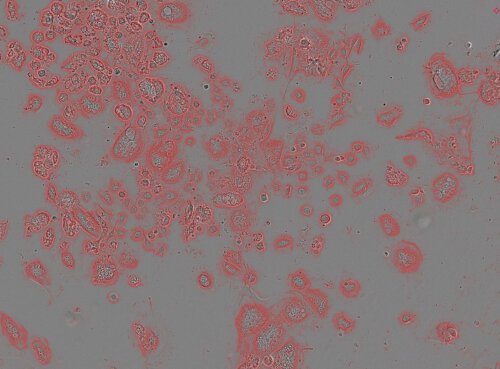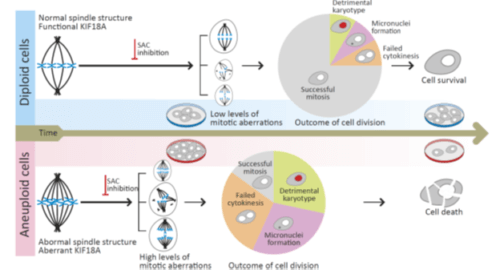Researchers from Tel Aviv University shed light on a 140-year-old mystery in an article published in Nature. The study shows for the first time how an abnormal number of chromosomes (aneploidy) - a unique feature of cancer cells that has been known to researchers for decades - can become a weak point of these cells. The research may in the future lead to the development of drugs that will take advantage of this weak point for targeted damage to cancer cells

What makes cancer cells different from normal cells in our body? And can this uniqueness be used to harm them and paralyze their operation? This fundamental question has troubled cancer researchers from the mid-19th century to the present day, and the search for unique characteristics of cancer cells is a building block of modern cancer research. A new study led by researchers from Tel Aviv University shows for the first time how an abnormal number of chromosomes (aneploidy) - a unique feature of cancer cells that has been known to researchers for decades - can become a weak point of these cells. The research may in the future lead to the development of drugs that will take advantage of this weak point for targeted damage to cancer cells.
The research, which was published in the prestigious journal Nature, was conducted in the laboratory of Dr. Uri Ben-David From the Sackler Faculty of Medicine of Tel Aviv University, in collaboration with 6 laboratories from 4 other countries (USA, Germany, Holland and Italy).
Aneuploidy is a hallmark of cancer. While normal human cells have two sets of 23 chromosomes, one from the father and one from the mother, aneuploid cells have a different number of chromosomes. When aneuploidy occurs in cancer cells, not only can the cells "tolerate" it, but it can even promote the cancer process. The connection between aneuploidy and cancer was discovered nearly 140 years ago, long before the understanding that cancer is a genetic disease (and even before the discovery of DNA as the hereditary material).
According to Dr. Ben-David, aneuploidy is actually the most common genetic change in cancer. About 90% of solid tumors, such as breast cancer and colon cancer, and 75% of blood cancers, are aneuploid. However, we understand only to a limited extent how this phenomenon contributes to the development and spread of cancer.
As part of the study, the researchers applied advanced bioinformatic (computational) methods in order to locate aneuploidy among about a thousand cancer cell cultures. The researchers then compared the genetic sensitivities of cells with a high level of aneuploidy to those of cells with a low level, as well as their sensitivity to various drugs and chemicals. The researchers found that aneuploid cancer cells exhibit an increased sensitivity to damage to the mechanism that controls the separation of chromosomes during cell division (mitotic checkpoint).
In addition, the researchers discovered the molecular basis for the increased sensitivity of the aneuploid cancer cells. Using genomic and microscopic methods, the researchers monitored the separation of chromosomes in cells treated with a substance known to inhibit the control mechanism for chromosome separation. The researchers found that when the mechanism is inhibited in cells with normal chromosomal composition, cell division stops. As a result, the cells manage to separate the chromosomes properly, and relatively few chromosomal problems arise. Conversely, when the mechanism is inhibited in aneuploid cells, cell division continues, but is accompanied by the formation of many chromosomal changes that impair the cells' ability to divide and even lead to their death.
The research has important implications for the treatment process in personalized cancer medicine. Drugs that inhibit the mechanism of chromosome separation are currently in clinical trials, but it is not known which patients will respond to the drugs and which will not. With the help of the research, it will be possible to use aneuploidy as a biological marker on the basis of which it will be possible to locate the patients who will respond better to these drugs. That is, to perform Adaptation of existing chemotherapy drugs to tumors with specific genetic characteristics.
Other than that, the researchers suggest To focus the development of new drugs on specific components of the control mechanism on the separation of chromosomes, which have been identified as particularly critical for the aneuploid cancer cells. The control mechanism for the separation of chromosomes consists of several proteins. The research shows that the sensitivity of aneuploid cells to damage to the various proteins is not the same, and there are certain proteins that are more severely damaged. Thus, the study provides motivation to develop specific inhibitors of additional proteins in the control mechanism.
"It should be emphasized that the research was done on cells in culture and not on cancer patients, and in order to translate it to the treatment of cancer patients, many more follow-up studies must be carried out. However, already at this stage it is clear that the research may have several medical consequences" - he concludes Dr. Ben-David.
The research was conducted in collaboration with laboratories from five different countries: Dr. Susanna Storchova (Technical University of Kaiserslautern, Germany), Dr. Jason Stumpf (University of Vermont, USA), Dr. Stefano Santaguida (University of Milan, Italy) ), and Dr. Todd Golov (Broad Institute of MIT and Harvard, USA).

More of the topic in Hayadan:
